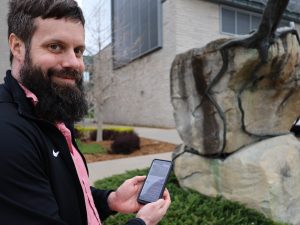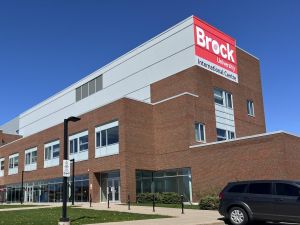 Physics professor Thad Harroun is collaborating with the Digital Scholarship Lab to help the fight against COVID-19 by using computing power.
Physics professor Thad Harroun is collaborating with the Digital Scholarship Lab to help the fight against COVID-19 by using computing power.As COVID-19 forced the majority of the Brock community to work, study and teach remotely, the vast majority of the University’s computer labs sat empty.
However, through clever initiative in collaboration with the Faculty of Mathematics and Science and the Digital Scholarship Lab, the computers have been switched back on to help fight the virus.
Thad Harroun, a Professor in the Department of Physics, was contacted by Tim Ribaric, Digital Services/Liaison Librarian to join the “Brock University Folders” Folding@Home team he set up. Folding@Home is a distributed computing project for simulating protein dynamics, including the process of protein folding and the movements of proteins implicated in a variety of diseases.
In order to understand the COVID-19 virus, Brock’s computer network is being used to visualize the protein structures contained in the virus. The data will help scientists understand how it works and bring us closer to the solution. The idea to use some of the University’s spare computing resources for research is something Ribaric and Harroun have talked about for some time.
“The Library has in the past pooled together their many computers that sit unused overnight for computationally intensive jobs,” said Harroun. “The Physics department has occasionally done the same with the computers in our labs.”
Harroun and Ribaric say the project is currently computing which atoms of the antibodies come close and lock onto the atoms of the SARS-CoV-2 virus.
“It’s the amazing idea that the three-dimensional arrangement of the individual atoms of a protein, thousands and thousands of atoms, is how a protein functions, and how a virus infect cells, and how the viral RNA is replicated, and so on,” said Harroun.
In addition to COVID-19 research, the network is used for other experiments as well. Harroun, who is supervising PhD candidate Tajik Samin, had previously been working on “unfolding” proteins by computer simulation.
“For Samin, there is an enzyme used in chemistry that can work at really high temperatures,” said Harroun. “That could open new efficiencies in chemical production if we knew how it maintains its form.”
People interested and able to lend their own computer resources to the project are encouraged to do so, and anyone can join the project by following the directions on the Folding@Home team page. So far, with the Department of Physics’ computers in action, the team has cracked the top 9,000 teams list for work credit.
“Using our computer resources effectively to fight COVID-19 is a great example of Brock’s collaboration during challenging times,” said Ejaz Ahmed, Dean of the Faculty of Mathematics and Science. “I look forward to the results of the research and congratulate the Physics department and the Digital Scholarship Lab or their efforts.”








